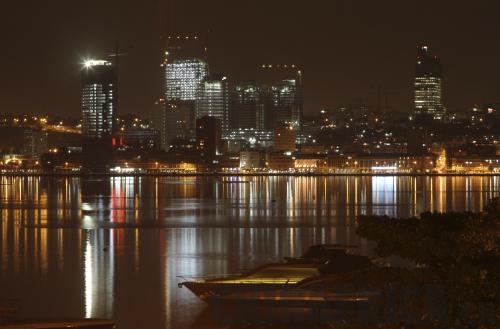|

The nation of Angola occupies a distinctive place in the narrative of African countries' transition from both colonialism and civil war toward national development. Having been occupied by the Portuguese from around 1482, the country got independence in 1975; however, a civil war that pitted the National Union for the Total Independence of Angola (UNITA) led by Jonas Savimbi and the People's Movement for the Liberation of Angola (MPLA) led by Jose Eduardo dos Santos persisted until 2002.
Since then Angola has been ranked as one of the fastest growing economies on the African continent backed by a profusion of oil and diamond reserves. Massive investments are being channeled into infrastructure development, hydroelectricity, roads, telecommunications and agriculture. The epitome of this emerging infrastructural development is the new $3.5 billion city named "Kilamba Kiaxi" being built by the Chinese 30 km from the capital Luanda.
Imbalance
However, against all this economic evolution, the city of Luanda was ranked as the world's most expensive city for expatriates in a 2011 survey conducted by a New York based consultancy firm, Mercer. It is the second year running the city has been in top spot. The survey covers 214 cities across five continents and measures the comparative cost of over 200 items in each location. It is the world's most comprehensive cost of living survey and is designed to help multinational companies and governments determine compensation allowances for their expatriate employees. The least expensive African cities on the survey are Tunis (207) and Addis Ababa (211).
Nathalie Constantin-Métral, a senior researcher at Mercer, said, "Accommodation prices are currently at record levels in cities like Luanda and this is generally the main reason why we find so many African cities high up in the ranking."
The BBC reported that a basic restaurant meal in Luanda can cost more than $100 while a one-bedroom apartment in downtown will set you back $5,500 to $7,500 per month. A single visit to the doctor is said to range around $200, 1 kg of tomatoes will cost you $20, and two-star hotels are asking for $170 per night for bed and breakfast only.
This Angolan exorbitance is however not matched by a corresponding quality of life. The country has a population of about 19 million and of these, 60 percent live in poverty on less than $2 per day. About one third of the country's population is all crammed into the capital Luanda, which according to the Mercer consulting survey, has beaten the perennials such as Tokyo, Oslo and New York as world's most expensive expat cities.
One of the most notable intricacies of this Luanda context is that, while poverty levels are high among the indigenous people, the expatriates also find life inflated. The economic profile of what expatriates pay for does not seem to result in any substantial trickle-down effects of what the locals receive as social and economic benefits impacting their lifestyles.
The Mercer consulting survey was based on a methodology that considered 13 categories termed as "13 Basket groups." These categories represent the main attributes of cost areas in any urban lifestyle. Of these 13, Luanda was found to have steep living costs in clothing, education, healthcare, groceries, household costs, restaurant, meals and hotels. These categories basically indicate that the high cost of living in Luanda is pivoted around issues related to personal upkeep and growth, food and health.
|